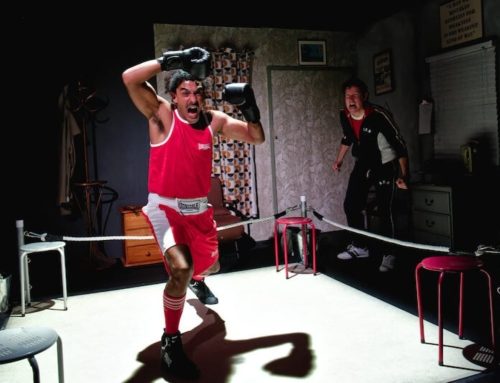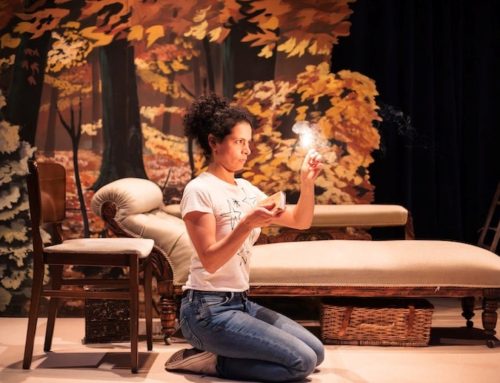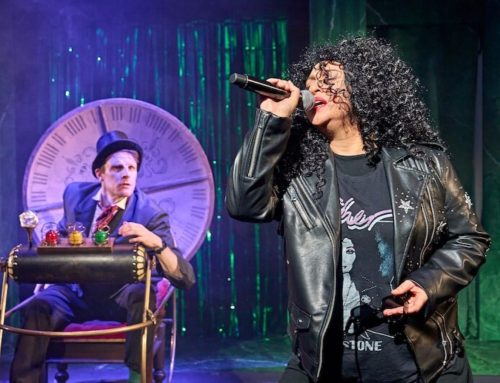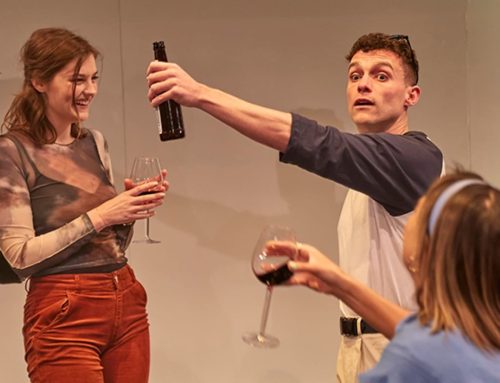The Park Theatre’s welcome revival of Clybourne Park does full justice to a modern classic and boasts tremendous performances all round.
4 April 2022
It was Karl Mark who apparently said that history repeats itself, first as tragedy, second as farce. Marx’s aphorism neatly describes the cyclical structure of Bruce Norris’ Clybourne Park, currently showing in a gloriously acidic revival at the Park Theatre.
The play’s first half is set in a white downtown neighbourhood of an unnamed US city in 1959. Householders Russ and Bev are packing up for a move to the suburbs, assisted by long-suffering and rarely-listened-to black maid Francine and husband Albert. The couple are grieving the loss to suicide of their son, whose self-destruction in a second-floor bedroom was apparently brought on by shame at his participation in a murky Korean war crime. Francine’s and Albert’s back story – 200 years of racism in America – provides a though-provoking counterpoint that is rather broader than Russ and Bev’s personal tragedy.
The couple’s neighbours, represented by the odious local community do-gooder Karl and deaf wife Betsy, are unhappy that the house has sold to a black couple. “You know as well as I do that this is a progressive community,” says Karl, which so far as he is concerned means calling the unwelcome interlopers “negroes” rather than “coloureds”. The problem is the new neighbours just will not fit it to the community, and after all “fitting into a community is really what it all comes down to.”
Russ will not be moved on the sale however, despite the best efforts of feeble local priest Tom to find an accommodation that will suit all sides. The final scene sees Russ burying a box with keepsakes of his dead son in the garden.
Fifty years later we are in the same house, but this time it is a white couple who are the gate crashers. What had become a majority black neighbourhood is now rapidly gentrifying, and the property’s new owners, Steve and Lindsay, want to knock down the old residence and build something bigger. Once again, the locals are not happy with the character of the neighbourhood changing, although this time it is black neighbours Lena and Kevin whose grievances, played as farce, come most sharply into focus. The re-emergence of Russ’ box of mementos in the final scene, dug up in the reconstruction of the house, is the only element that provides any kind of metaphorical closure to the story.
Clybourne Park is a supremely well-structured and always watchable piece of circular theatre. It is a kind of theatrical comfort-food that never really reaches any conclusions but is highly effective as a riff on America’s racial divide. It poses pertinent questions on as to how much has really changed over the last half-century in America and suggests it might not be as much as we would like to think. White people still have the power and black people must still work to be heard.
The Park’s production is directed at a solid pace Oliver Kaderbhai and the sometimes-claustrophobic feel of the ‘Park 200’ ideally sets off the oppressive tones of the play’s darker elements, aided by James Turner’s pared back set. The performances are uniformly good, particularly Aliyah Odoffin as Francine / Lena and Andrew Langtree as the obnoxiously oleaginous Karl / Steve.
Watching Clybourne Park’s gloriously funny second half I got the distinct feeling that is Noel Coward were born today this is the kind of play he might be writing – right down to the characters skulking shamefaced off stage at the end. Highly recommended.
Duration: 2 hours 10 mins. One interval.
Writer Bruce Norris
Director Oliver Kaderbhai
Trish Wadley Productions and David Adkin in association with Park Theatre.
Cast
JIM/ TOM I MICHAEL FOX
KARL/ STEVE I ANDREW LANGTREE
RUSS/ DAN I RICHARD LINTERN
BETSY/ LINDSAY I KATIE MATSELL
FRANCINE/ LENA I ALIYAH ODOFFIN
BEV/ KATHY I IMOGEN STUBBS
ALBERT/ KEVIN I ERIC UNDERWOOD
Full Disclosure: I paid full box-office price for the ticket.





